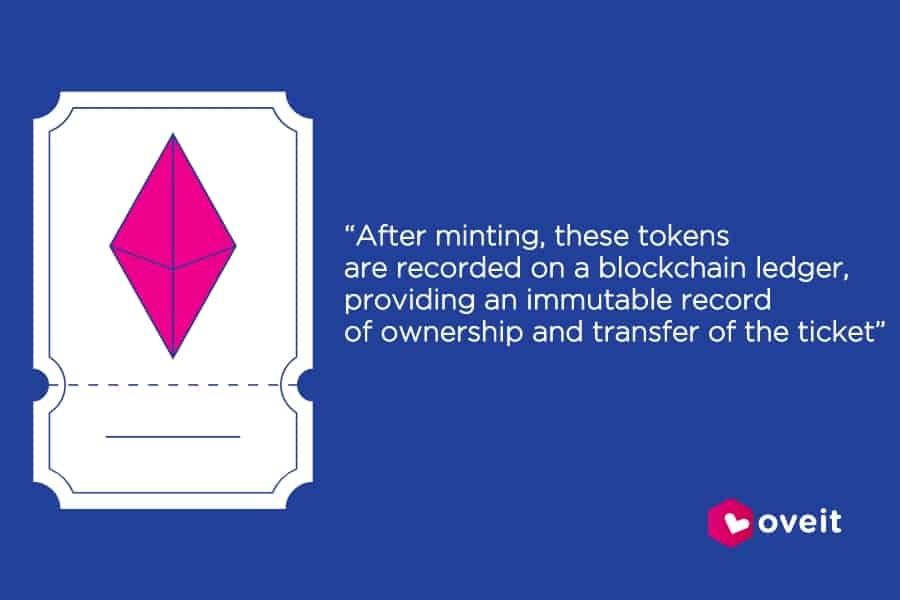At Oveit, we’ve been building software solutions for live experiences for more than 7 years. And we believe that NFT tickets are the future of event ticketing.NFT tickets offer a secure and personalized solution for event organizers to manage and track ticket sales while providing a unique experience for ticket holders. We’re building a secure, transparent, and profitable ecosystem for everyone involved.
Why NFT Ticketing is the Future of Event Ticketing
NFT ticketing provides the best solution to some of the major issues that traditional (e)ticketing methods face. And we’re including here fraud, scalping, and the lack of ownership rights for the ticket holder. With NFT ticketing, you can create unique, secure, and traceable digital records that can’t be duplicated or counterfeited.
This also provides an opportunity to generate more revenue through better control over the secondary market. NFT tickets can be bought and sold in a secure and transparent manner, allowing you to set the right rules in which these tickets can be sold on the secondary market. You can easily set lower and upper limits for ticket resale, as well as perpetual royalties through the smart contract that governs the NFT tickets.
What are NFTs and How Do They Work for Ticketing?
NFTs, or non-fungible tokens, are digital assets that are unique and cannot be replicated. They are built on blockchain technology, which provides a secure and transparent platform for creating and tracking ownership of these assets. NFTs can represent a wide range of digital assets, including artwork, music, and now, event tickets, and can also be connected with physical goods, such as merchandise, food, or beverages.
NFT ticketing works by creating a unique digital token for each event ticket that is sold. Each token is linked to a specific seat or entry point, providing secure access to the event. After minting, these tokens are recorded on a blockchain ledger, providing an immutable record of ownership and transfer of the ticket.

Because NFT tickets are unique and can be verified on the blockchain, they are more secure than traditional tickets. This eliminates the risk of fraud and scalping, which can be a major problem in our industry. They also give the ticket holder ownership over the whole experience, as they are buying a unique digital asset that they can keep or sell.
Overall, NFT ticketing provides a secure and transparent way to create, sell, and track event tickets.
Creating Fan Engagement through NFT Ticketing
Blockchain technology not only provides a secure and profitable way to sell tickets. It also creates new opportunities for fan engagement. With NFT tickets, you can offer fans a unique and personalized experience that goes beyond just attending the event.
NFT ticketing allows you to create limited edition tickets, each with its own unique design and artwork. These tickets can be customized to match the theme of the event or the brand of the organizer. Fans can own a piece of the event by purchasing these limited editions NFT tickets, creating a sense of exclusivity and value.
You can also create interactive experiences using NFT tickets. For example, create scavenger hunts for treasure hunts that require fans to collect different NFT tickets to unlock special prizes or access exclusive areas of the event. This creates a sense of community and engagement among fans, as they work together to collect the NFT tickets and unlock rewards.
Ultimately, NFT tickets allow you to reward their most loyal fans. Organizers can create VIP NFT tickets that provide exclusive access to meet and greets with performers, backstage tours, or other special experiences. Online and offline. These NFT tickets can be transformed into membership passes, serving your audience long after the initial event has ended.
The Pros and Cons of Traditional Event Ticketing
When it comes to traditional (e)ticketing, it involves printing physical tickets and selling them through different channels like box offices, ticket agencies, and online marketplaces. The downside is that these tickets are often exposed to fraud, counterfeiting, and scalping. And your community is the one that suffers.
But, one of the good things about traditional ticketing is that it’s familiar and easy to use. People know how to buy and use both physical and electronic tickets, and they make for a cool keepsake or souvenir from the event.
However, there are some serious drawbacks to traditional ticketing. Fake tickets can be made easily, which may affect your revenue. And will definitely cause disappointment for fans who buy them. Plus, scalping–selling tickets for inflated prices–is a major issue, especially for popular events.
Traditional ticketing also lacks transparency and traceability. This makes it hard to keep track of physical tickets, enforce policies, and ensure that only authorized tickets are being used to access the event.
While traditional ticketing has its perks, it’s becoming less and less relevant in today’s world. NFT ticketing is a more secure and transparent solution to traditional ticketing’s challenges. Plus, NFTs offer personalized fan experiences and more opportunities for revenue.
Comparing NFT ticketing and Traditional (e)tickets
NFT ticketing and traditional (e)ticketing are two distinct approaches to event ticketing. Each with its own advantages and disadvantages. In this section, we will compare the two approaches in terms of security, tracking, fan engagement, ease of use, and other relevant factors.
Security
NFT ticketing offers a more secure solution compared to traditional ticketing. NFT tickets are unique digital assets, making them less vulnerable to fraud and scalping. They are also recorded on the blockchain, providing an immutable record of ownership and transfer. In contrast, traditional tickets can be easily replicated or counterfeited, leading to lost revenue and frustrated fans.
New revenue stream
While with traditional tickets you have no control over the secondary market transactions, NFT ticketing allows you to protect your community against scalpers. But it also helps you generate a new revenue stream through (perpetual) royalties. Meaning each time one of your tickets is resold, a cut can be distributed your way. Or towards any other third-party entity, like a non-profit or young artist you support.
Tracking opportunities
Compared to traditional ticketing, NFT ticketing provides improved tracking capabilities that are more efficient and transparent. Every record can be tracked on the blockchain, providing real-time visibility into the movement and ownership of each ticket. This helps organizers enforce policies such as reselling restrictions or ensure that only authorized tickets are being used to access the event. In contrast, traditional tickets can be difficult to track.
Fan Engagement through NFT ticketing
NFT tickets can be customized with unique designs and artwork. And by using them, you can offer interactive experiences such as scavenger hunts, and meet-and-greets. Or even access to future content and experiences. This creates a sense of exclusivity and value for fans, leading to increased engagement and loyalty.
In contrast, traditional tickets are often generic in design and do not offer the same level of personalization or engagement. More than often, an electronic event ticket grants access to a specific location, for a specific period of time. And nothing more. But is going to change with the help of NFT ticketing.
Ease of Use for traditional (e)ticketing
Traditional ticketing offers a more familiar and accessible experience compared to NFT ticketing. Many people are familiar with the process of buying and using physical and electronic tickets, and they can be purchased easily through a variety of channels. In contrast, NFT ticketing is a newer technology that may be unfamiliar to some fans, and it requires a digital wallet and an understanding of blockchain technology to use. However, as more people become familiar with blockchain technologies and NFT ticketing, it is expected to become more widely adopted.
Other Relevant Factors
NFT tickets can be sold at higher prices than traditional tickets due to their unique and exclusive nature, leading to increased revenue. But the most important aspect is represented by the fact that they are governed by smart contracts, allowing them to be used long after the initial event is over. So an NFT ticket can be much more than just an event ticket, it can be the gateway to future experiences and benefits. Both virtual and in-person. Acting like a membership pass, the NFT ticket can help you govern all the interactions you have with your audience, helping you create a loyal fan base.
Overall, traditional ticketing has its advantages in terms of familiarity and accessibility. But NFT ticketing offers a more secure, transparent, engaging, and environmentally friendly solution for event ticketing. As more people become familiar with NFT ticketing, we strongly believe it will become the future of event ticketing.
Conclusion: Which Ticketing Method is Right for Your Event?
In the end, the ticketing method you choose for your event really comes down to what you need. And what you’re trying to achieve. If you’re looking for more security, tracking, and engagement with your fans, NFT ticketing is the way to go. With NFTs, you get a more secure and transparent solution, and you can create some really cool experiences for your fans.
On the other hand, if you want to make it easy for your fans to get tickets and don’t necessarily need all the benefits mentioned above, traditional ticketing might be a better fit for you. Traditional ticketing is what people are used to and can be more accessible for some folks, especially for smaller events.
Lucky for you, here at Oveit we offer both ticketing options for our partners, helping them deliver the experiences their communities expect from them. And we can do it for you as well.
It all comes down to your goals and what you want to achieve with your event. Take some time to weigh the pros and cons of each method. And you’ll find the right ticketing method that suits your event and makes your fans happy.

